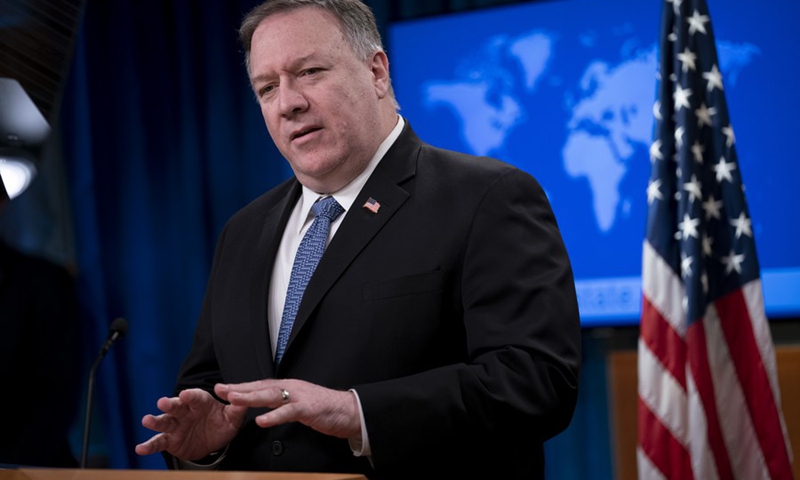
US Secretary of State Mike Pompeo speaks during a press briefing in Washington D.C., the United States, on March 5, 2020. (Xinhua/Liu Jie)
China has displayed firm resolution to defend its national interests and demonstrate the fact that any person and action that harms China's interests will have to face the consequences. As President Joe Biden took the oath of office, China quickly announced to sanction more than two dozen officials and members of former president Donald Trump's cabinet, including former US Secretary of State Mike Pompeo, Trump's national security adviser Robert O'Brien, deputy national security advisor Matthew Pottinger, and trade advisor Peter Navarro for having "seriously violated" China's sovereignty, according to a statement of the Chinese Ministry of Foreign Affairs in the early hours of Thursday Beijing Time.Those on the sanctions list have a bad record in trampling on basic norms when dealing with China. In the past four years, they have promoted a series of frenzied acts against China. They have also brazenly interfered in China's domestic issues, fabricating lies, making accusations and conspiracies about sovereignty-related issues such as Hong Kong, Xinjiang and the island of Taiwan. What they have done undermined China's interests, offended the Chinese people and seriously disrupted China-US relations.
The sanctions are unprecedented given the number of those sanctioned, their high-ranking positions in the Trump administration and stringent measures against them. The message it has sent is quite clear and strong. "It has conveyed a message that you cannot damage China's sovereign interests without paying any price. There could be diplomatic frictions and conflicts between countries, but no bottomless acts that cross the line will be allowed," Song Guoyou, deputy director of the Center for American Studies, Fudan University, told the Global Times.
US anti-China politicians and officials must be clear: They cannot leave unscathed after violating China's sovereign interests and spoiling China-US relations whether they are for private benefits, out of ideological prejudice or the needs of a domestic partisan struggle.
On one hand, politicians that have crossed China's line should bear the consequences for their anti-China actions. On the other, China needs to use sanctions to deter those who want to make trouble for China. US officials and politicians cannot be allowed to make a profit from China while attacking China.
Xin Qiang, a professor at Fudan University, said the sanctions are more substantive than symbolic. The 28 former officials on the sanctions list and companies and institutions associated with them are restricted from doing business with China. It will bring those sanctioned real pain, Xin emphasized.
Washington's "revolving door" is well-known - senior officials will be hired by companies, NGOs, or think tanks after they leave the government. China's sanctions, like a sword of Damocles hanging over their heads, will force those entities having businesses and cooperation with China to think twice whether they should develop relations with those former Trump administration officials.
This is not the first time China has sanctioned US politicians. But it is the first time China imposed sanctions on the US side not as a tit-for-tat move. Previously, China only carried out reciprocal sanctions on US politicians and officials as a counterstrike to US sanctions first imposed on us. But this time, it indicates China has been determined enough to take sanctions proactively as a means to defend its interests.
China has championed cooperation. But does that mean China has to swallow the insults without doing anything after one damages China's core interests? China is not a paper tiger. China's move this time should be a wake-up call for anti-China forces within the US, as well as China hawks within the new Biden administration. They should draw a lesson from their predecessors in the Trump administration.

